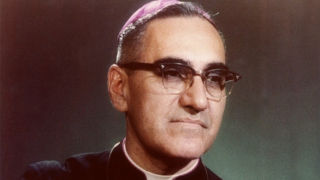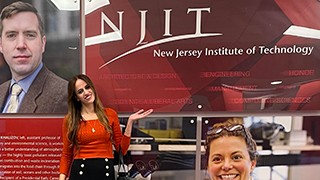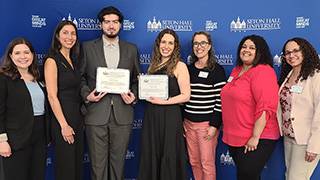Writings of St. Oscar Romero Added to Core II - Seton Hall University
Friday, January 29, 2021

The addition to the course is from a selection of St. Romero's sermons, a book entitled The Violence of Love. I read this book many years ago, long before Romero was named a saint or even beatified, as he was by Pope Francis (in 2019 and 2015, respectively) and found it profoundly moving. From 1978 to 1980, the year he was killed, Romero spoke out with increasing urgency and intensity about the human rights violations occurring in his country; the sermons are from these crucial years in his ministry. The government and affiliated death squads were actively oppressing anyone who spoke out for the rights of the poor and the marginalized, and this oppression included members of the clergy, who were getting killed. Romero knew that he easily could be on the list to be assassinated, but he chose to continue to speak out.
St. Romero has been part of the Core for some time, as he is featured in Prof. Maribel Landrau's Core III/Catholic Studies course, the Church in Latin America, which has been running for two years now. He is also central to our Romero-King week and a half (held last spring for the first time and which we will celebrate again this spring, whether virtually or in person depends on the situation with the virus). During the Romero-King memorial, the Core, in conjunction with the MLK Leadership Program, Catholic Studies, and other campus groups and leaders, celebrates the legacy of the two great men of faith and icons of civil rights – Martin Luther King, Jr., who was killed on April 4, 1968 and Romero, killed on March 24th. This year, again, we will have two other "on-the-green" events (whether virtual or in person) as well as other events, such as films, available for students and the rest of the Seton Hall Community.
Adding St. Romero to Core II deepens this connection already established with the Core. Dr. Ki Joo (KC) Choi, Coordinator of Core II, says, "I'm very excited to have St. Romero's The Violence of Love as an option for Core 2. We all think we know what love is, but this text stretches and challenges our moral imaginations to see love as something more than a feeling, an attraction, or a desire. Love, especially Christian love, is personal and political; it is a courageous and righteous love, a love that speaks out against injustice, even if doing so puts one's own life at risk. St. Romero not only preached this love; he also lived it, and paid the ultimate price because of it. He is the saint for our troubled times, and students will surely find his reflections on love inspirational, even life transforming." Prof. Maribel Landrau, Assistant Director of the Core, is also enthusiastic about adding St. Romero to Core II:
The first time I was asked to teach Latin American Catholicism by Dr. Ines Murzaku I was thrilled by it. I am a Latina woman who loves to share her own story and the stories of many Latinos in the States or in Latin America that made a difference in society. One of the individuals that I was scheduled to teach was Oscar Romero. Saint Bishop Romero was the top of the icing of that course! I loved teaching my students the life of Romero. Like Pope Francis, his priority was those who do not have a voice. He became the voice of the voiceless. Saint Romero used his platform to make others aware about the atrocities his homeland was experiencing. One of my favorite quotes from Romero is the following: "A bishop will die but the church of God -the people-will never perish."
Giselle Pineda, senior Biology and Catholic Studies double major and whose background is Salvadoran, is glad that current Core II students will study Romero in their class, as she studied him in her Core III with Prof. Landrau. She says, "Saint Oscar Romero's impact on El Salvador teaches us all that we have the ability to help those in need, and fight for social equality regardless of our societal class."
As we continue to develop the Core with a close eye on diversity, equity, and inclusion, we hope to include more readings such as these excerpts from the sermons of St. Oscar Romero. Let's remember him as we approach the anniversary of his death on March 24th, and as we walk under the dome of the library and look up – there we can see a quote from the saint: "My word remains." We are excited that his words will be remembered now in a new way in the Core.
Categories: Faith and Service





